Orr, a defneseman and considered by many to be the greatest player in the history of the NHL, was signed by the Bruins at the age of 14. League rules at the time dictated that Orr could not play in the NHL until turning 18. Orr bided his time playing for the Oshawa Generals of the Ontario Hockey League, and in his final season scored 94 points in 47 games, an average of two points per game, an unheard of average for a defenseman.
He would win the Calder Trophy during his first season with the Bruins after scoring 41 points in 61 games. He would miss nine games late in the season with a knee injury, foreshadowing the injury problems that would plague his career. Prior to Orr's arrival, the Bruins had missed the playoffs for seven consecutive seasons and while they would not make the post-season during Orr's rookie season, they would make the playoffs in every subsequent season of Orr's career in Boston.
Bobby Orr during the 1966-67 season
Despite only playing in 46 games of the 1967-68 season, Orr would win the first of eight consecutive Norris Trophies. Back on track in 1968-69, he would play in 67 games and top 20 goals for the first time with 21 and total 64 points.
Orr would explode the following season, scoring 33 goals and adding a whopping 87 assists to total 120 points, six short of the league record and become the first and only defenseman to lead the NHL in scoring, which would net him the Art Ross Trophy and be named the winner of the Hart Trophy. The Bruins would advance through the playoffs, eventually winning the Stanley Cup in overtime of Game 4, a goal captured in an iconic photograph of Orr flying through the air in celebration. Following the playoffs, he would be named the recipient of the Conn Smythe Trophy, making him the first player to win four major NHL awards in the same season.
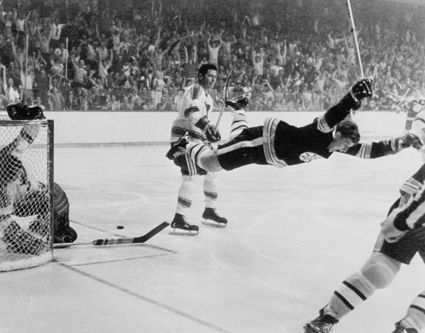
Orr would top his league leading point total from the previous season with 139 points in 1970-71, including a league leading 102 assists, 26 more than the next closest player, and place second in the scoring race behind Bruin's teammate Phil Esposito while winning the Hart Trophy for the second time. Orr would record a plus-minus rating of +124 that season, an NHL record that still stands today.
1971-72 would see Orr play in 76 games and equal his 37 goals from the previous season while totaling 117 points. Orr and the Bruins would capture their second Stanley Cup and Orr would win his fifth consecutive Norris Trophy, his third consecutive Hart Trophy and his second Conn Smythe Trophy.
Orr celebrating the Bruins championship
while drinking from the Stanley Cup
1972-73 saw another 100 point season after returning from knee surgery following the Stanley Cup, which forced Orr to miss the 1972 Summit Series against the Soviet Union after being named to Team Canada.
The Bruins would return to the finals in 1973-74 following a regular season in which Orr would score 32 goals and 90 assists for 122 points followed by another 18 points in 16 playoff games.
Orr would once again win the NHL scoring race in 1974-75, capturing the Art Ross Trophy for the second time after a career high 46 goals, becoming the first defenseman to ever score 40 goals, combined with 89 assists for 135 points. He would be named to the NHL First All-Star Team for the eighth consecutive season, win his eighth consecutive Norris Trophy, play in his seventh NHL All-Star Game and win his first Lester B. Pearson Award.
His multiple knee surgeries would catch up to him, limiting him to only 10 games of the 1975-76 season. While essentially playing on one knee, Orr would compete for Team Canada in the 1976 Canada Cup, earning rave reviews and being named tournament MVP in the last hurrah of his storied career.
Orr playing the last great hockey of his career during the 1976 Canada Cup
A move to the Chicago Black Hawks followed for the next two seasons but he totaled just 26 games and 27 points in 1976-77 and 1978-79.
His final career totals are 657 games played, 270 goals and 645 assists for 915 points after ten seasons in Boston and the two in Chicago. At the time of his retirement, Orr was the leading defenseman in NHL history in goals, assists and points. The only players who have averaged more points per game than Orr are Wayne Gretzky, Mario Lemieux and Mike Bossy - all forwards.
Orr's speed, acceleration and creative offensive ability, combined with his toughness and defensive skills revolutionized the position of defense and changed the game forever. He also moved beyond the world of hockey, becoming a mainstream celebrity in the United States.
While we have given you a brief overview of the game-changing career of Bobby Orr, entire books are devoted to his career and the impact he had on the NHL, and we here at Third String Goalie recommend Searching for Bobby Orr.
Today's featured jersey is a 1969-70 Boston Bruins Bobby Orr jersey as worn while flying through the air after scoring the Stanley Cup winning goal in 1970.
When purchasing a Bobby Orr Bruins jersey, please be aware that Orr seldom wore his name on the back of any Boston Bruins jersey during his entire career. Perhaps only for national TV games, as was the practice back then. Quite often Orr jerseys are sold on ebay or other online stores with Orr's name incorrectly on the back of the jersey, as if his iconic #4 wasn't enough.
Even during Orr's first season in Chicago no names were used on the back, making just the final six games of his career with the Black Hawks in 1978-79, a sad and unfortunate end to a great career and not exactly worthy of recreating for your collection, and the 1976 Canada Cup the few times Orr regularly wore his name on the back of a jersey outside of the NHL All-Star Game.
Today's video selections is the surprising find of the 1979 Bobby Orr Jersey Retirement Ceremony, somewhat oddly scheduled for the night of an exhibition game against the Soviet Wings. I can't recall any other jersey retirement scheduled for an exhibition game before. One would think that in 1979 any Soviet team on it's own would be enough of a draw to fill the building.
Dasherboard: Speaking of Boston, the Boston College Eagles and Boston University Terriers played in the men's portion of the "Frozen Fenway" event last night, putting the NHL's Winter Classic rink at Fenway Park to some much needed additional use, and both teams wore special jerseys for the occasion.
The Boston College's special gold jerseys had the addition of a green stripe, as a tribute to Fenway's "Green Monster", and a diagram of a baseball field where the players names normally go on the back.
While there was nothing wrong with BC's jerseys, they were really nothing to get excited about to be honest. Meanwhile, Boston University really "knocked one out of the park" with their sweaters. Rather than their normal block font on the front, the Terriers adopted the instantly recognizable Boston Red Sox font on the front
and then added the simply wonderful sleeve patch, a take on the Red Sox logo, only with the socks turned into hockey skates! Just brilliant.
Now, where do we get one?
The Sartorial Gods took notice and ensured that justice was rewarded as the game was won by the better dressed Boston University Terriers by a score of 3-2. BU pulled out to a 3-0 lead, their first goal coming from David Warsofsky, who is having a good week by any accounts, having just been part of Team USA's gold medal victory in the recently concluded World Junior Tournament. Warsofsky celebrated his goal with an inspired baseball swing celebration.
Boston College pulled one back just before the end of the second period and then got to within one with a short-handed goal at 7"47 of the third to really make a game of it, however Boston University held on for the win, in part thanks to a late penalty against Boston College which denied us a more frantic finish.
One other highlight of the game for viewers at home was getting to see NESN's Kathryn Tappen, a favorite here at Third String Goalie.
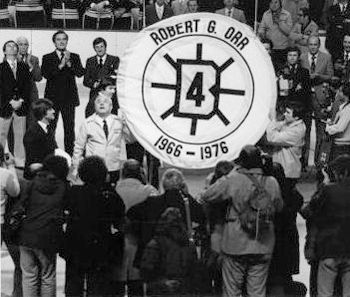

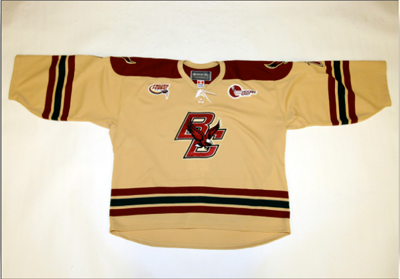
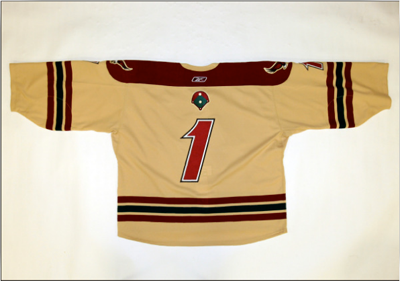
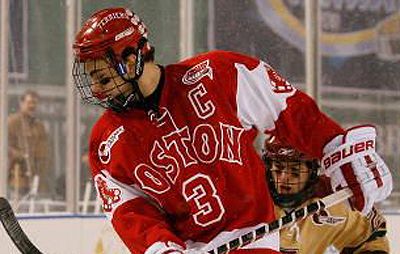
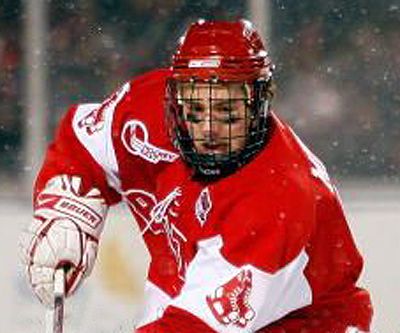


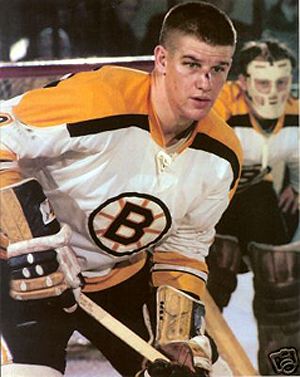
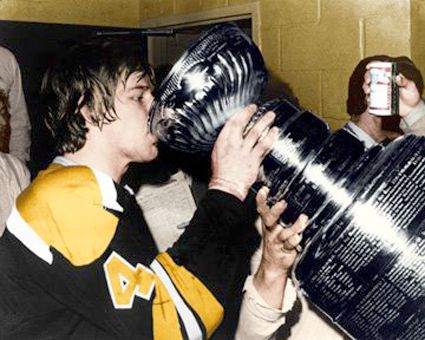
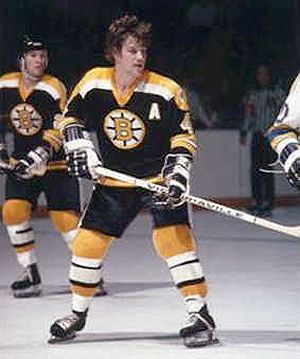
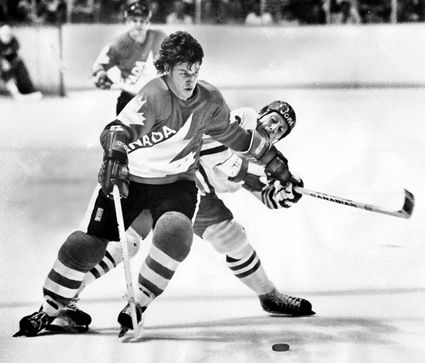
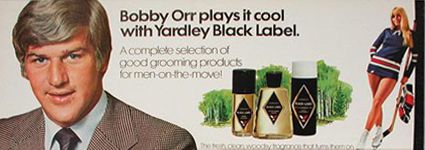
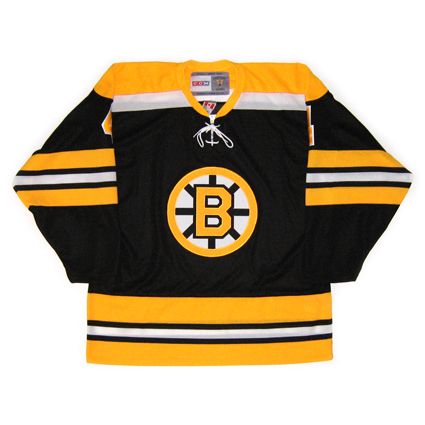
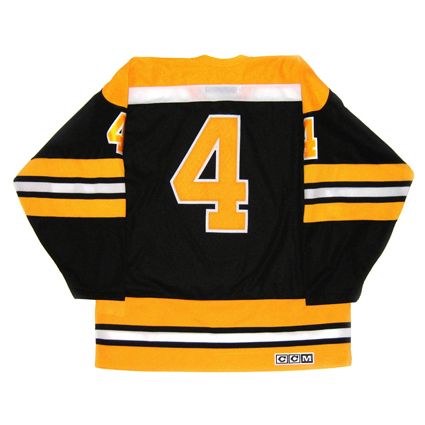










"Now, where do we get one?"
ReplyDeleteIf you find out PLEASE LET US KNOW!
According to Jake Seiner of The Boston Hockey Blog, "The jerseys will not be for sale, and there will be no replicas made, according to [BU coach Jack] Parker. The players will get to keep their respective jerseys, and those will be the only ones made to look like this."
ReplyDeletehttp://thebostonhockeyblog.blogspot.com/2010/01/bu-frozen-fenway-jerseys.html
I for one, am disappointed, as are many others if you read the comments on the linked thread.